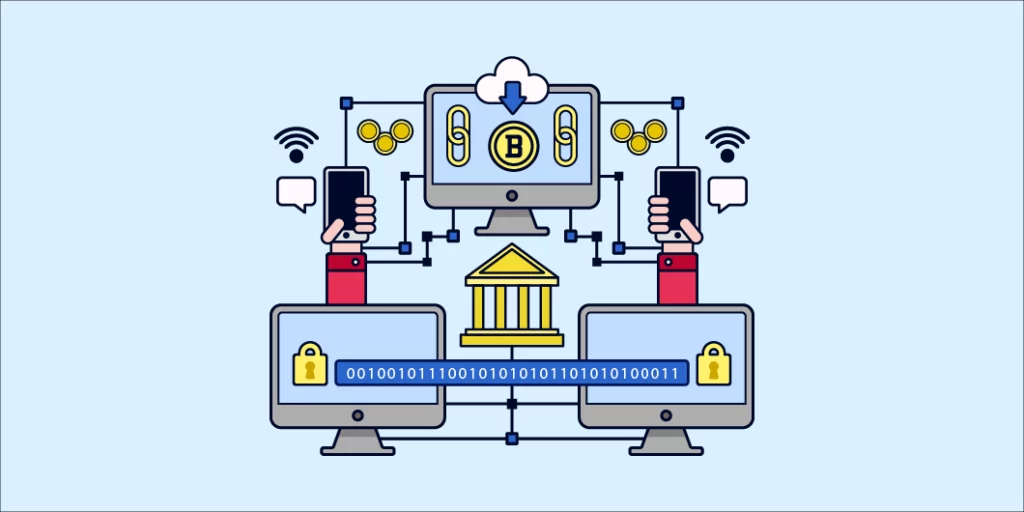
The Role of Blockchain and Cryptocurrency in Government Efficiency
Understanding Blockchain Technology Beyond Cryptocurrency: The True Power of Blockchain
Blockchain is often associated with cryptocurrency, but its technology extends far beyond digital wallets. At its core, blockchain is a system that securely records information in an unchangeable and decentralized way, making it highly valuable in various industries.
How Blockchain Works
Blockchain functions like a shared digital notebook, storing data in blocks that are securely linked using encryption. Instead of keeping all records in a single location, blockchain distributes data across a network of computers. Once a record is added, it cannot be altered, ensuring transparency and trust among users.
Practical Applications of Blockchain
Blockchain is already making an impact across multiple sectors. It enhances supply chain management by tracking products from origin to destination, ensures secure and transparent voting, protects patient data in healthcare, enables digital identity management in Web3, and provides transparency in financial transactions. As adoption grows, blockchain’s role in these and other industries will continue to expand, offering innovative solutions for data security and trust.
The High Cost of Administrative Inefficiencies
Government operations often face significant financial losses due to administrative errors. Manual data entry, redundant processes, and outdated technologies contribute to inefficiencies that drain resources. In the United States, for example, losses stemming from improper payments, errors, and fraud have been estimated at over 100 billion dollars annually. Similar challenges are evident worldwide, where inefficiencies in public administration hinder progress and erode public trust.
How Blockchain Can Help
Blockchain makes government operations more secure, transparent, and efficient. Because records on the blockchain cannot be changed, errors and fraud are much less likely. Every transaction is permanently recorded, making it easy to track and verify information.
Smart contracts take this a step further by automating tasks. These are self-executing agreements that follow preset rules. For example, a smart contract could automatically release funds when a project meets certain conditions, reducing the need for manual approvals. This speeds up processes, cuts paperwork, and lowers costs, making government services faster and more reliable.
Secure and Transparent Public Records
Blockchain’s tamper-proof ledger creates lasting records for critical data such as land registries, identity documents, and public contracts. Early adopters have shown that replacing traditional databases with blockchain leads to fewer errors, enhanced security, and improved public trust.
Enhanced Digital Identity and Citizen Services
Digital identity systems based on blockchain simplify the verification process for accessing government services. Citizens gain a single, secure digital identity, reducing the need for multiple documents and lowering the risk of fraud. This streamlined process not only speeds up service delivery but also protects sensitive personal data.
Rethinking Voting Systems
Voting systems benefit from blockchain by recording each vote in a secure, unalterable ledger. This method minimizes the risk of fraud and creates a clear audit trail. With more reliable records, trust in the electoral process strengthens, laying the groundwork for more transparent democratic practices.
Financial Transparency and Fraud Prevention
The real-time tracking of transactions through blockchain enables clear oversight of government spending. Smart contracts enforce compliance automatically, ensuring that every transaction adheres to set guidelines. This enhanced transparency acts as a deterrent to fraud and reduces the financial losses caused by administrative errors.
Streamlining Cross-Border Transactions and Tax Collection
Blockchain simplifies international financial transactions by cutting processing times and reducing fees. Government-backed digital currencies and cryptocurrencies have the potential to streamline cross-border payments and tax collection. Automation through blockchain minimizes errors and helps curb opportunities for tax evasion.
Challenges and the Road Ahead
Transitioning to a blockchain-powered system requires overcoming significant challenges. Integration with existing infrastructures, scalability issues, and updating regulatory frameworks are all part of the process. Privacy concerns must also be addressed as public data becomes more transparent. Careful planning and gradual implementation are essential to ensure that these new systems enhance efficiency without compromising security.
A Future of Transparent and Efficient Governance
Countries such as Estonia, China, and the United Arab Emirates have already begun harnessing blockchain for public services. Their early initiatives offer a roadmap for transforming public administration on a global scale. As governments continue to grapple with the financial and operational burdens of outdated systems, blockchain presents a promising path toward a more efficient, secure, and accountable future.
Blockchain is more than a technological innovation. It represents a shift toward modern, transparent governance that can reduce losses caused by administrative errors and build a stronger public trust. The journey toward a blockchain-powered government may be challenging, but the potential benefits for society are enormous.